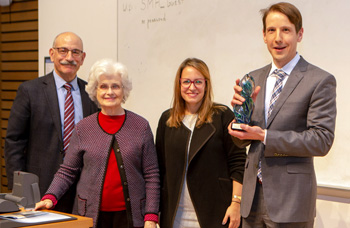An immersive experience for Keenan trainees

By Anna Wassermann

(l to r) Dr. Ori Rotstein, Barbara Keenan, Dr. Galit Alter and Dr. Michael Kofler.
Dr. Michael Kofler joined the Keenan Research Centre for Biomedical Science (KRCBS) as a post-doctoral research fellow in 2015. Since then, he’s established himself as an exceptional talent in the area of protein interactions, working under Dr. Andras Kapus, director of the Trauma, Critical Care and Inflammation platform at the KRCBS.
Last fall, Dr. Kofler was recognized for his contributions to Dr. Kapus’ lab when he received the Keenan Research Excellence Award, presented to a student in the KRCBS who possesses significant potential as a scientist. He was the first post-doctoral fellow to win the prestigious award. We sat down with Dr. Kofler, now a research associate, to learn more about his post-doctoral experience and his ongoing commitment to the KRCBS.
What brought you to the KRCBS?
My interest encompasses the structure-function relationships in proteins, along with protein interactions and their cellular distribution. When I came across Dr. Kapus’ work on TAZ and YAP transcription factors, which are proteins that activate key genes needed for wound healing and organ regeneration, I reached out to him and we connected right away. After a few conversations, I came to join his team.
Can you tell us about your research?
Last year, our team identified sequences required for TAZ and YAP to enter the nucleus through a unique mechanism, likely specific to these proteins. When TAZ and YAP accumulate in the nucleus, they reprogram the cell, which if done improperly, can result in fibrosis – a major cause of lasting and progressive tissue damage in a variety of common chronic illnesses and hypertension.
Now, we’re developing tools to look at the regulation of TAZ and YAP in more detail. A better understanding of how these proteins work could offer unique ways for us to manipulate and interfere with their activities. Ultimately, this could allow us to identify novel targets for the development of drugs against fibrosis.
What have you enjoyed most about your time at the KRCBS?
Everything! Dr. Kapus is a fantastic mentor, a brilliant scientist and he knows how to motivate his team. Being able to work so closely with other scientists has been incredibly beneficial, and the infrastructure here is fantastic. The centre is well organized, and the Core Facilities have a great variety of equipment and resources. It’s really a playground for scientists.
How has your experience at the KRCBS prepared you for the future?
I’ve been able to develop new approaches to study the cellular distribution and interactions of proteins. This spectrum of techniques is applicable to many scientific questions. I’ve been lucky to learn from Dr. Kapus about the elements of good research, including how to formulate and plan interesting, relevant and cutting-edge projects. Knowing how to define projects and approach scientific problems will be of great help.
<!–
This paper is an example of how St. Michael’s Hospital is making Ontario Healthier, Wealthier, Smarter.
–>
About St. Michael’s Hospital
St. Michael’s Hospital provides compassionate care to all who enter its doors. The hospital also provides outstanding medical education to future health care professionals in more than 27 academic disciplines. Critical care and trauma, heart disease, neurosurgery, diabetes, cancer care, care of the homeless and global health are among the Hospital’s recognized areas of expertise. Through the Keenan Research Centre and the Li Ka Shing International Healthcare Education Centre, which make up the Li Ka Shing Knowledge Institute, research and education at St. Michael’s Hospital are recognized and make an impact around the world. Founded in 1892, the hospital is fully affiliated with the University of Toronto.
About Unity Health Toronto
Unity Health Toronto, comprised of Providence Healthcare, St. Joseph’s Health Centre and St. Michael’s Hospital, works to advance the health of everyone in our urban communities and beyond. Our health network serves patients, residents and clients across the full spectrum of care, spanning primary care, secondary community care, tertiary and quaternary care services to post-acute through rehabilitation, palliative care and long-term care, while investing in world-class research and education. For more information, visit www.unityhealth.to.
<!–
Media contacts
For more information, or to arrange an interview with one of the authors, please contact:
Leslie Shepherd
Manager, Media Strategy, St. Michael’s Hospital
416-864-6094 or 416-200-4087
shepherdl@smh.ca
–>
